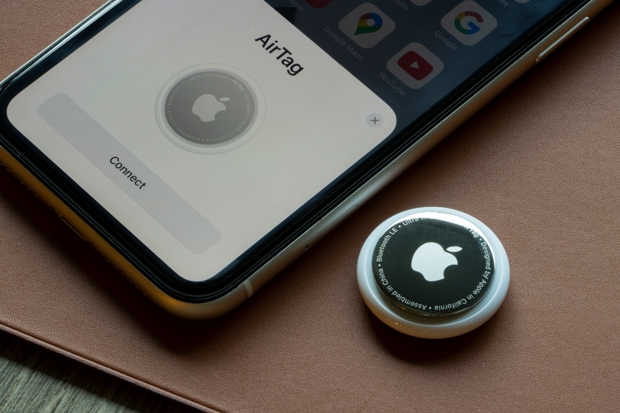Warnings of thieves using AirTags to steal high-value cars

Motorists are being warned about the use of Apple AirTags and other similar devices by tech-savvy car thieves.
NFU Mutual recently worked with police and car theft specialists to recover an AirTag from a stolen Range Rover which was recovered before it could be shipped to Africa.
The discovery confirms suspicions that thieves are using the low cost tracking devices to steal expensive vehicles while reducing the risk of being caught by police.
Organised car theft gangs are using the technology to prove that cars ‘stolen to order’ are in thieves’ possession and are being shipped to their new illegal owners – often in overseas locations.
AirTags and similar trackers are small devices designed to be attached to keys or slipped inside wallets to aid location of frequently-lost valuables. They use Bluetooth signals to communicate with nearby phones to give their owners an idea of the tag’s location.
As AirTags can connect with anybody’s phone within 20 metres of the tracking device, they can be used to locate items across both short and long distances, updating their location when connected to a new phone. This means the owner of the AirTag can track the device even when it is in a different country.
Andrew Chalk, car insurance specialist from NFU Mutual, said that AirTags and other similar devices are providing a cheap and easily-hidden way for thieves to track target vehicles back to the owners’ homes.
Thieves can then return at night to break in and steal the keys from the home or use electronic scanners to gain entry to the cars and drive them away.
"We’re urging all motorists to make themselves aware of this tactic to make sure their vehicle doesn’t become an item on a thief’s shopping list."
"Those in the South East and Midlands should pay particular attention, as our data shows these areas see significantly higher levels of theft of luxury vehicles like Range Rovers," added Chalk.

Motorists are advised to keep their vehicles locked at all times when not in use and fit an accredited alarm for security, as well as a tracking device to locate their vehicle if stolen.
They should also fit a mechanical immobiliser such as a steering wheel or pedal lock and consider marking component parts using a forensic marking solution.
Other security measures include keeping the vehicle in a lockable building if possible or parking in well-lit areas that are overlooked, having the vehicle identification number etched on windows, fitting a hidden battery isolation or a fuel cut-off switch.
Taking photographs of unusual features, modifications, damage or repairs could also aid identification if stolen. Motorists should also ensure any valuables are removed from the vehicle and not share information on social media that could indicate where vehicles are kept.
For modern vehicles, electronic keys should be kept in a Faraday pocket or box at night. NFU Mutual customers can receive a discount on Scorpion Track devices.
DC Chris Piggott of the National Vehicle Crime Intelligence Service said, "With some gangs able to access keyless vehicles with specialist equipment, we’re concerned that motorists could be leading clued up criminals to their valuable possessions."
The tagging devices being used each contain features that allow people to detect and disable them, so it’s worth motorists familiarising themselves with these as well as checking their home security measures.
Do I need protection for keyless start but not keyless entry?


